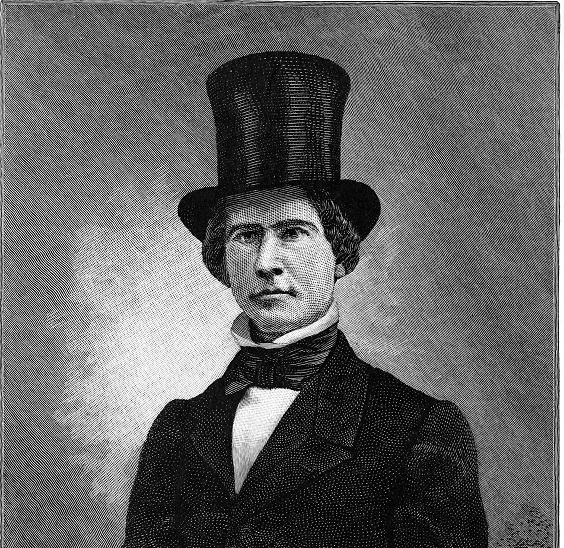
A Series by Clyde Wilson
THEODORE O’HARA (1820-1867) of Kentucky. “The Bivouac of the Dead” is often thought of as related to The War of 1861-1865. Like the “Star-Spangled Banner” it was confiscated for the North. Theodore O’Hara was a Confederate officer. (He was with Gen. Albert Sidney Johnston when he was fatally wounded.) He wrote the poem about 1850 in commemoration of his comrades, the Kentucky volunteers who had lost their lives in the war with Mexico.
The Bivouac of the Dead
The muffled drum’s sad roll has beat
The soldier’s last tattoo;
No more on Life’s parade shall meet
That brave and fallen few.
On fame’s eternal camping ground
Their silent tents to spread,
And glory guards, with solemn round
The bivouac of the dead.
No rumor of the foe’s advance
Now swells upon the wind;
Nor troubled thought at midnight haunts
Of loved ones left behind;
No vision of the morrow’s strife
The warrior’s dreams alarms;
No braying horn or screaming fife
At dawn shall call to arms.
Their shriveled swords are red with rust,
Their plumed heads are bowed,
Their haughty banner, trailed in dust,
Is now their martial shroud.
And plenteous funeral tears have washed
The red stains from each brow,
And the proud forms, by battle gashed
Are free from anguish now.
The neighing troop, the flashing blade,
The bugle’s stirring blast,
The charge, the dreadful cannonade,
The din and shout, are past;
Nor war’s wild note, nor glory’s peal
Shall thrill with fierce delight
Those breasts that nevermore may feel
The rapture of the fight.
Like the fierce Northern hurricane
That sweeps the great plateau,
Flushed with triumph, yet to gain,
Come down the serried foe,
Who heard the thunder of the fray
Break o’er the field beneath,
Knew the watchword of the day
Was “Victory or death!”
Long had the doubtful conflict raged
O’er all that stricken plain,
For never fiercer fight had waged
The vengeful blood of Spain;
And still the storm of battle blew,
Still swelled the glory tide;
Not long, our stout old Chieftain knew,
Such odds his strength could bide.
Twas in that hour his stern command
Called to a martyr’s grave
The flower of his beloved land,
The nation’s flag to save.
By rivers of their father’s gore
His first-born laurels grew,
And well he deemed the sons would pour
Their lives for glory too.
For many a mother’s breath has swept
O’er Angostura’s plain —
And long the pitying sky has wept
Above its moldered slain.
The raven’s scream, or eagle’s flight,
Or shepherd’s pensive lay,
Alone awakes each sullen height
That frowned o’er that dread fray.
Sons of the Dark and Bloody Ground
Ye must not slumber there,
Where stranger steps and tongues resound
Along the heedless air.
Your own proud land’s heroic soil
Shall be your fitter grave;
She claims from war his richest spoil —
The ashes of her brave.
Thus ‘neath their parent turf they rest,
Far from the gory field,
Borne to a Spartan mother’s breast
On many a bloody shield;
The sunshine of their native sky
Smiles sadly on them here,
And kindred eyes and hearts watch by
The heroes sepulcher.
Rest on embalmed and sainted dead!
Dear as the blood ye gave;
No impious footstep here shall tread
The herbage of your grave;
Nor shall your glory be forgot
While Fame her record keeps,
For honor points the hallowed spot
Where valor proudly sleeps.
Yon marble minstrel’s voiceless stone
In deathless song shall tell,
When many a vanquished ago has flown,
The story how ye fell;
Nor wreck, nor change, nor winter’s blight,
Nor time’s remorseless doom,
Can dim one ray of glory’s light
That gilds your deathless tomb.
*************
The Old Pioneer
A dirge for the brave old pioneer!
Knight-errant of the wood!
Calmly beneath the green sod here
He rests from field and flood
The war-whoop and the panther’s screams
No more his soul shall rouse,
For well the aged hunter dreams
Beside his good old spouse.
A dirge for the brave old pioneer!
Hushed now his rifle’s peal;
The dews of many a vanish’d year
Are on his rusted steel;
His horn and pouch lie moldering
Upon the cabin-door;
The elk rests by the salted spring,
Nor flees the fierce wild boar.
A dirge for the brave old pioneer!
Old Druid of the West!
His offering was the fleet wild deer,
His shrine the mountain’s crest.
Within his wildwood temple’s space
An empire’s towers nod,
Where erst, alone of all his race,
He knelt to Nature’s God.
A dirge for the brave old pioneer!
Columbus of the land!
Who guided freedom’s proud career
Beyond the conquer’d strand;
And gave her pilgrim sons a home
No monarch’s step profanes,
Free as the chainless winds that roam
Upon its boundless plains.
A dirge for the brave old pioneer!
The muffled drum resound!
A Warrior is slumb’ring here
Beneath his battle-ground.
For not alone with beast of prey
The bloody strife he waged,
Foremost where’er the deadly fray
Of savage combat raged.
A dirge for the brave old pioneer!
A dirge for his old spouse!
For her who blest his forest cheer,
And kept his birchen house,
Now soundly by her chieftain may
The brave old dame sleep on,
The red man’s step is far away,
The wolf’s dread howl is gone.
A dirge for the brave old pioneer!
His pilgrimage is done;
He hunts no more the grizzly bear
About the setting sun.
Weary at last of chase and life,
He laid him here to rest,
Nor recks he now what sport or strife
Would tempt him further west.
A dirge for the brave old pioneer!
The patriarch of his tribe!
He sleeps–no pompous pile marks where,
No lines his deeds describe.
They raised no stone about him here,
Nor carved his deathless name —
An empire is his sepulchre,
His epitaph is Fame.






